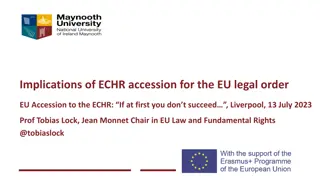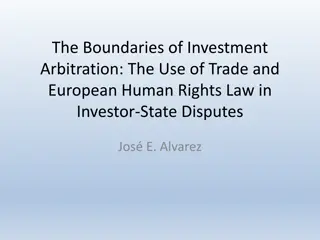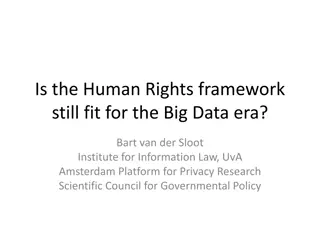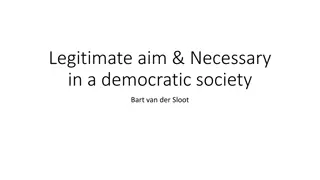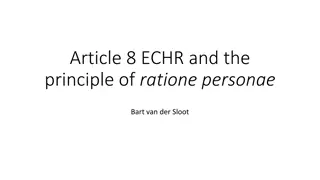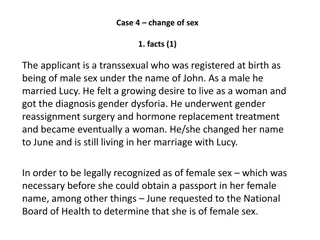WHEN DOES ARTICLE 8 OF THE ECHR
Engagement with gender identity as a private life matter protected under Article 8 of the ECHR, exploring positive obligations, relevant factors, margin of appreciation, legal recognition and marriage implications, consensus, and unsuccessful Article 8 arguments.
Download Presentation

Please find below an Image/Link to download the presentation.
The content on the website is provided AS IS for your information and personal use only. It may not be sold, licensed, or shared on other websites without obtaining consent from the author.If you encounter any issues during the download, it is possible that the publisher has removed the file from their server.
You are allowed to download the files provided on this website for personal or commercial use, subject to the condition that they are used lawfully. All files are the property of their respective owners.
The content on the website is provided AS IS for your information and personal use only. It may not be sold, licensed, or shared on other websites without obtaining consent from the author.
E N D
Presentation Transcript
ALBA & HRLA WHEN DOES ARTICLE 8 OF THE ECHR MAKE A DIFFERENCE? GENDER IDENTITY Sarah Hannett QC Matrix 24 May 2022 sarahhannett@matrixlaw.co.uk matrix@matrixlaw.co.uk +44 (0)20 7404 3447
OVERVIEW (1) Engagement: Gender identity is one of the most intimate private life matters of a person and falls within the personal sphere protected by Art. 8 : Van K ck v. Germany (2003) 37 EHRR 51 [51], [69]. Gender identity is one of the most basic essentials of self-determination : YY v. Turkey (App. No. 14793/09) at [102]. Positive obligations: H m l inen v. Finland [2014] 37 BHRC 55 (GC) regard must be had to the fair balance that has to be struck between the competing interests of the individual and the community as a whole [65]. notion of respect is not clear cut especially as far as positive obligations are concerned and will vary considerably from case to case [66]. Relevant factors: (i) factors that concern the individual, (iii) factors that concern the state and its systems; and (iii) the position in other member states [66]. matrix@matrixlaw.co.uk +44 (0)20 7404 3447
OVERVIEW (2) Margin of appreciation: H m l inen States enjoy a certain MoA when implementing positive obligations under Article 8 Restricted margin where a particularly important facet of an individual's existence or identity is at stake. Wider margin where no consensus within member states, or where the case raises sensitive moral or ethical issues . Wider margin if the state is required to strike a balance between competing public and private interests or ECHR rights Consensus Recognition/implementation: Recognition of legal status (no/minimal margin) Implementation of that legal status (wider margin) matrix@matrixlaw.co.uk +44 (0)20 7404 3447
ARTICLE 8 MAKING A DIFFERENCE Legal recognition/marriage: Goodwin v. United Kingdom (2002) 35 EHRR 18 Positive obligation to introduce a scheme under which a trans person could obtain a new birth certificate and marry in the acquired gender Wide margin of appreciation as to how scheme implemented Consensus/incrementalism: Rees v. UK (1986) 9 EHRR 56, Cossey v. UK (1990) 13 EHRR 622, Sheffield & Horsham v. UK (1998) 27 EHRR 163 Legal recognition cannot be conditional on surgery and must be rapid, transparent and accessible: AP, Gar on and Nicot v. France (App Nos. 79885/12, 52471/13 and 52596/13) (6.4.17) (recently reaffirmed in X & Y v. Romania (App Nos 2145/16 and 20607/16) (19.1.21) [Query also Article 3] SV v. Italy (App No. 55216/08) (11.10.18) Contact with children not to be deprived on ground of trans status only: AM v. Russia (App No. 47220/19) (6.7.21) Re M (Children) [2018] 2 FLR 800 (CA) (Article 14 taken with Article 8) matrix@matrixlaw.co.uk +44 (0)20 7404 3447
UNSUCCESSFUL ARTICLE 8 ARGUMENTS Conditions on status recognition: Requirement for a diagnosis of gender dysphoria does not breach Article 8: AP, Gar on and Nicot v. France [Query self-ID] Same sex marriage in acquired gender: H m l inen v. Finland (2014) 47 EHRR 55 (GC) Type of parental status: X, Y and Z v. UK (1997) 24 EHRR 143 (GC) R (JK) v. Registrar General [2016] 1 All ER 354 R (McConnell) v. Registrar General [2021] 1 WLR 684 (CA) OH & GH v. Germany (25.6.19); AH and Others v. Germany (29.1.20) Non-binary status: Non-binary identity is an aspect of private life for the purposes of Article 8 No positive obligation under Article 8 to provide a passport with an X sex marker: R (Elan Cane) v. SSHD [2022] 2 WLR 133 (SC) Recognition case but no consensus/no ECtHR case law in support matrix@matrixlaw.co.uk +44 (0)20 7404 3447
SARAH HANNETT QC sarahhannett@matrixlaw.co.uk Griffin Building, Gray s Inn London WC1R 5LN DX400 Chancery Lane, London matrix@matrixlaw.co.uk +44 (0)20 7404 3447
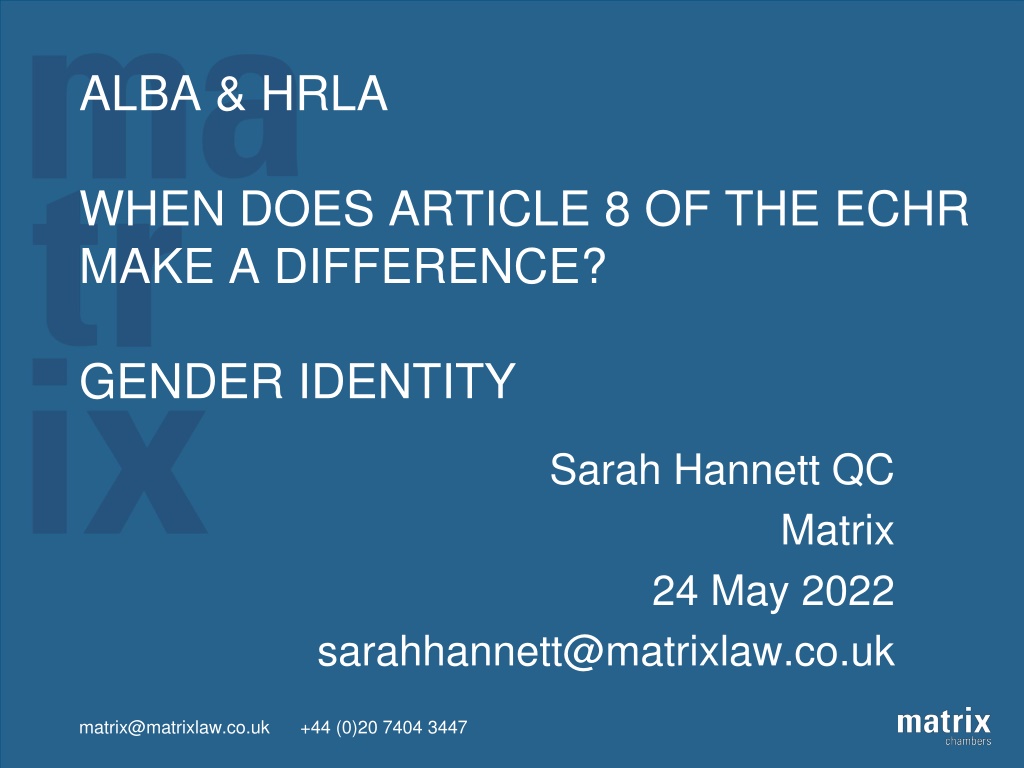




 undefined
undefined








